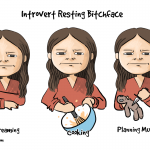
Does your introversion get in the way of your career? You’re not alone. While many introverts
are very successful, it’s not unusual to have a difficult time adjusting to the social requirements
of a job or career.
As an introvert, you may even have some self-esteem issues on top of your
low social battery; social anxiety and introversion often go hand in hand. One of the best ways
to combat social anxiety and low social stamina is by building confidence.
Increased confidence can help you navigate through work situations that you may be avoiding or delaying. When you
boost your confidence, you empower yourself with mental and emotional strength to make your
mark in the workplace as an introvert.
Know Your Strengths
As an introvert, conversation and socializing may be challenging, especially at work. But that’s okay. Introverts
apply many other incredible skills on the job, from written communication to multi-
tasking to work ethic. When you’re aware of what your strengths are, the drawbacks of your
introversion won’t feel so impactful. You have a career because you are great at what you
do—take positive feedback from colleagues and management as a reminder of your skills.
Remembering and affirming what makes you strong and skilled can help you have confidence in
what you bring to the table.
Write Down Your Talking Points
If you’re an introvert that has trouble remembering your talking points during conversations or
meetings, consider writing down important discussions or questions to bring up. Writing down
your thoughts, feelings, and questions can help you remember them even when you’re
flustered, nervous, or low on your social battery. Feel free to ask your colleagues for a written
conversation instead of a verbal if it makes things easier for you. Having an email trail is always
useful, too!
Dress With Confidence
Confidence can be grown in a few ways, including with what you wear. Create a workspace that
makes you feel good and authentic, including your wardrobe. You should feel comfortable, safe,
and true to yourself. Whether it’s a boldly patterned tie or name brand shoe, your wardrobe can
make a huge difference in your confidence levels. You don’t need an office job to tailor your
wardrobe and workspace to your liking, either. Blue-collar workers can decorate their protective
gear or work tools with stickers, colors, or engravings. From a hard hat decal that says “hug a logger” to a water bottle painted with your favorite color, take advantage of anything that helps
boost your confidence.
Maintain Boundaries
Everyone has their limits—even extroverts. Setting personal and professional boundaries can
help you feel more comfortable in an extroverted environment like work. Let people know
politely but firmly when you’re uncomfortable with certain behavior, like being touched or
contacted outside of work. Make sure people don’t cross those boundaries. When boundaries
are breached, it can make you feel vulnerable and insecure. When your boundaries are
respected, you’re more comfortable, which can make you feel better about your environment
and contribution to your job. Firm boundaries create confidence!
Create a Support System
Even when introverted, all humans are social creatures. Introverts may only desire social
interaction with specific people or in limited doses. Create a support system that can help you
with the stresses of work. A like-minded coworker, friend, or family member can help you air out
grievances and release stress, helping you feel less alone. When you’ve got support on your
side in the form of friendship and comfort, you’ll feel more confident tackling more difficult work
or social situations. A support system can consist of any people who you feel comfortable
talking to in person or online. Not only will they help you when times are tough, but they can
also color your life with affirmations and enrichment.
Think Outside the Box
Differences between social batteries and work styles should be celebrated; different
perspectives can be a great asset in the workplace. You may not work in the same way as your
coworker due to your introversion, but in no way is it a bad thing! Practicing your social skills is
useful, but you also need to maintain some level of comfort. You can think outside the box to
create a workspace that is tailored to your needs. Perhaps some of your work is remote with a
hybrid setup. Maybe you’re more comfortable writing emails than making phone calls. Do some
creative thinking to make your work environment as productive as possible. You can work with
your team to come up with solutions together if necessary. A good workplace will want you to be
comfortable. When you’re in your element, you’re confident, too.
Conclusion
Many lines of work involve socializing, but that doesn’t mean there’s no room for an introvert in
the workplace. Practicing social skills and tailoring the work environment to meet your needs
can make a huge difference in your confidence levels, allowing you to use your introversion as
an asset instead of a liability. Some of the most successful people are introverts, including Bill
Gates and Albert Einstein. The key to a successful career is skill, confidence, and comfort, and
they often go hand in hand. With the right attitude and some self-care practices, you can thrive
in any career as an introvert.










